Crisis Management Model - PDF
VerifiedAdded on 2021/06/01
|9
|3898
|50
AI Summary
Contribute Materials
Your contribution can guide someone’s learning journey. Share your
documents today.
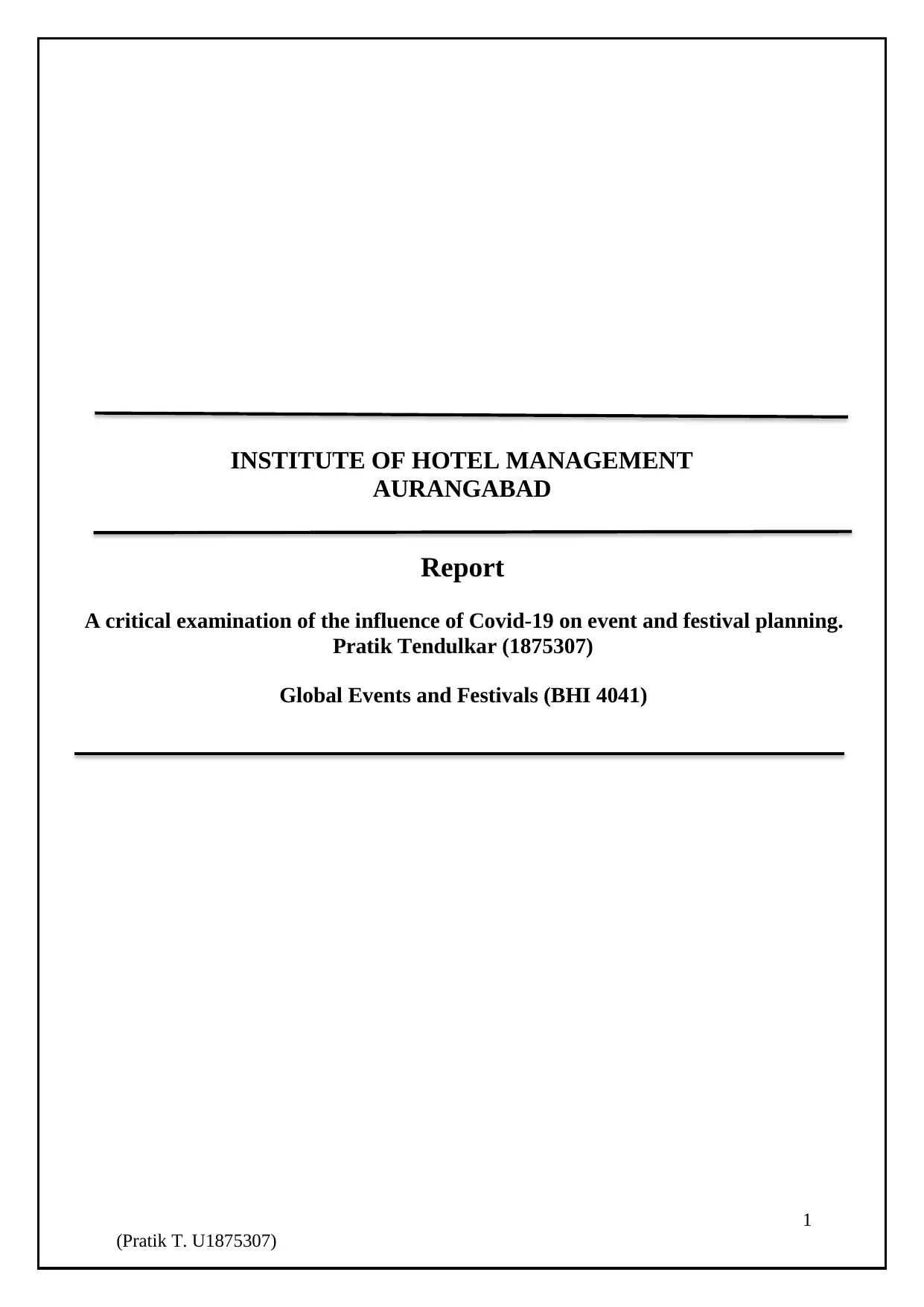
1
(Pratik T. U1875307)
INSTITUTE OF HOTEL MANAGEMENT
AURANGABAD
Report
A critical examination of the influence of Covid-19 on event and festival planning.
Pratik Tendulkar (1875307)
Global Events and Festivals (BHI 4041)
(Pratik T. U1875307)
INSTITUTE OF HOTEL MANAGEMENT
AURANGABAD
Report
A critical examination of the influence of Covid-19 on event and festival planning.
Pratik Tendulkar (1875307)
Global Events and Festivals (BHI 4041)
Secure Best Marks with AI Grader
Need help grading? Try our AI Grader for instant feedback on your assignments.
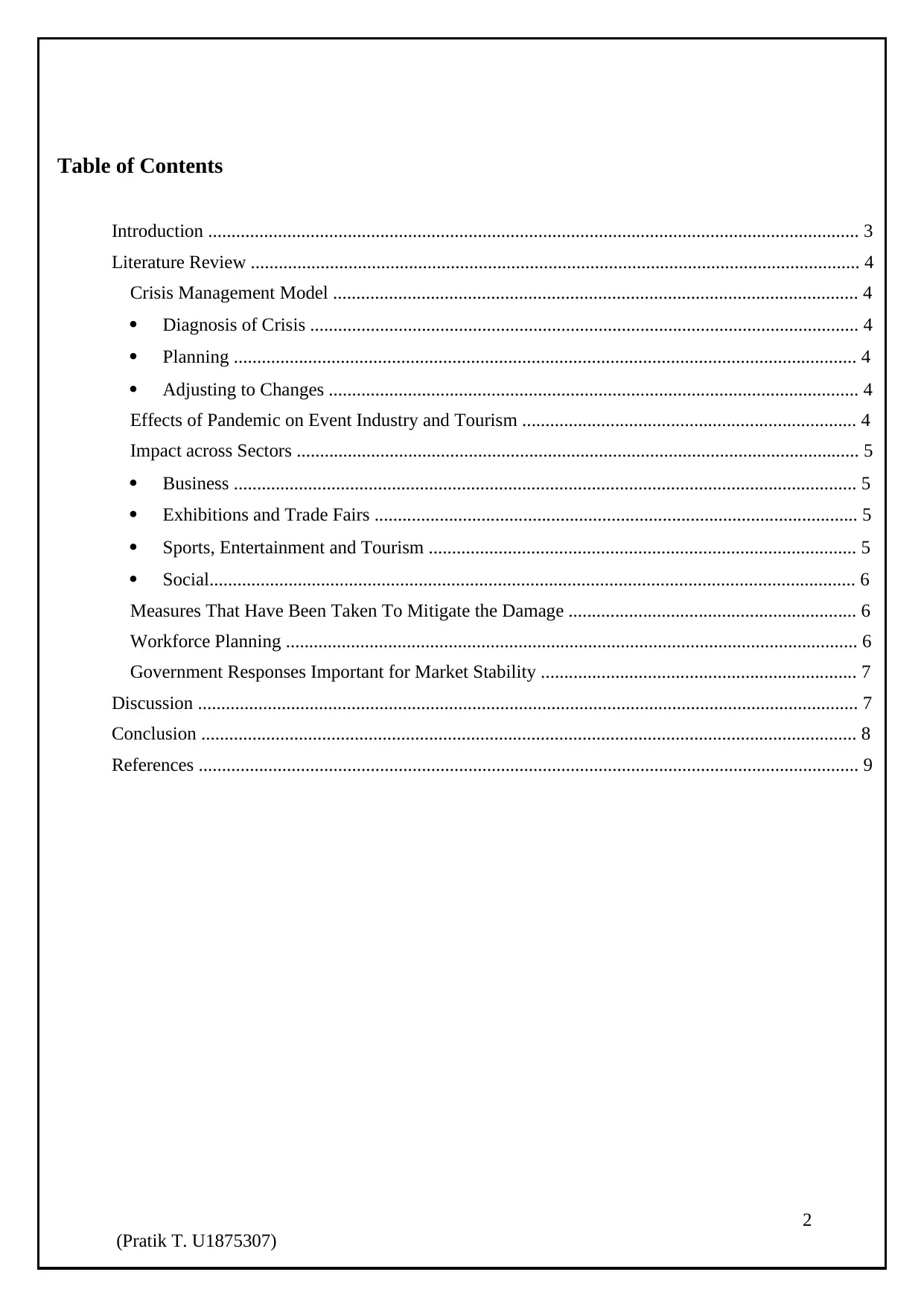
2
(Pratik T. U1875307)
Table of Contents
Introduction ............................................................................................................................................ 3
Literature Review ................................................................................................................................... 4
Crisis Management Model ................................................................................................................. 4
Diagnosis of Crisis ...................................................................................................................... 4
Planning ...................................................................................................................................... 4
Adjusting to Changes .................................................................................................................. 4
Effects of Pandemic on Event Industry and Tourism ........................................................................ 4
Impact across Sectors ......................................................................................................................... 5
Business ...................................................................................................................................... 5
Exhibitions and Trade Fairs ........................................................................................................ 5
Sports, Entertainment and Tourism ............................................................................................ 5
Social........................................................................................................................................... 6
Measures That Have Been Taken To Mitigate the Damage .............................................................. 6
Workforce Planning ........................................................................................................................... 6
Government Responses Important for Market Stability .................................................................... 7
Discussion .............................................................................................................................................. 7
Conclusion ............................................................................................................................................. 8
References .............................................................................................................................................. 9
(Pratik T. U1875307)
Table of Contents
Introduction ............................................................................................................................................ 3
Literature Review ................................................................................................................................... 4
Crisis Management Model ................................................................................................................. 4
Diagnosis of Crisis ...................................................................................................................... 4
Planning ...................................................................................................................................... 4
Adjusting to Changes .................................................................................................................. 4
Effects of Pandemic on Event Industry and Tourism ........................................................................ 4
Impact across Sectors ......................................................................................................................... 5
Business ...................................................................................................................................... 5
Exhibitions and Trade Fairs ........................................................................................................ 5
Sports, Entertainment and Tourism ............................................................................................ 5
Social........................................................................................................................................... 6
Measures That Have Been Taken To Mitigate the Damage .............................................................. 6
Workforce Planning ........................................................................................................................... 6
Government Responses Important for Market Stability .................................................................... 7
Discussion .............................................................................................................................................. 7
Conclusion ............................................................................................................................................. 8
References .............................................................................................................................................. 9
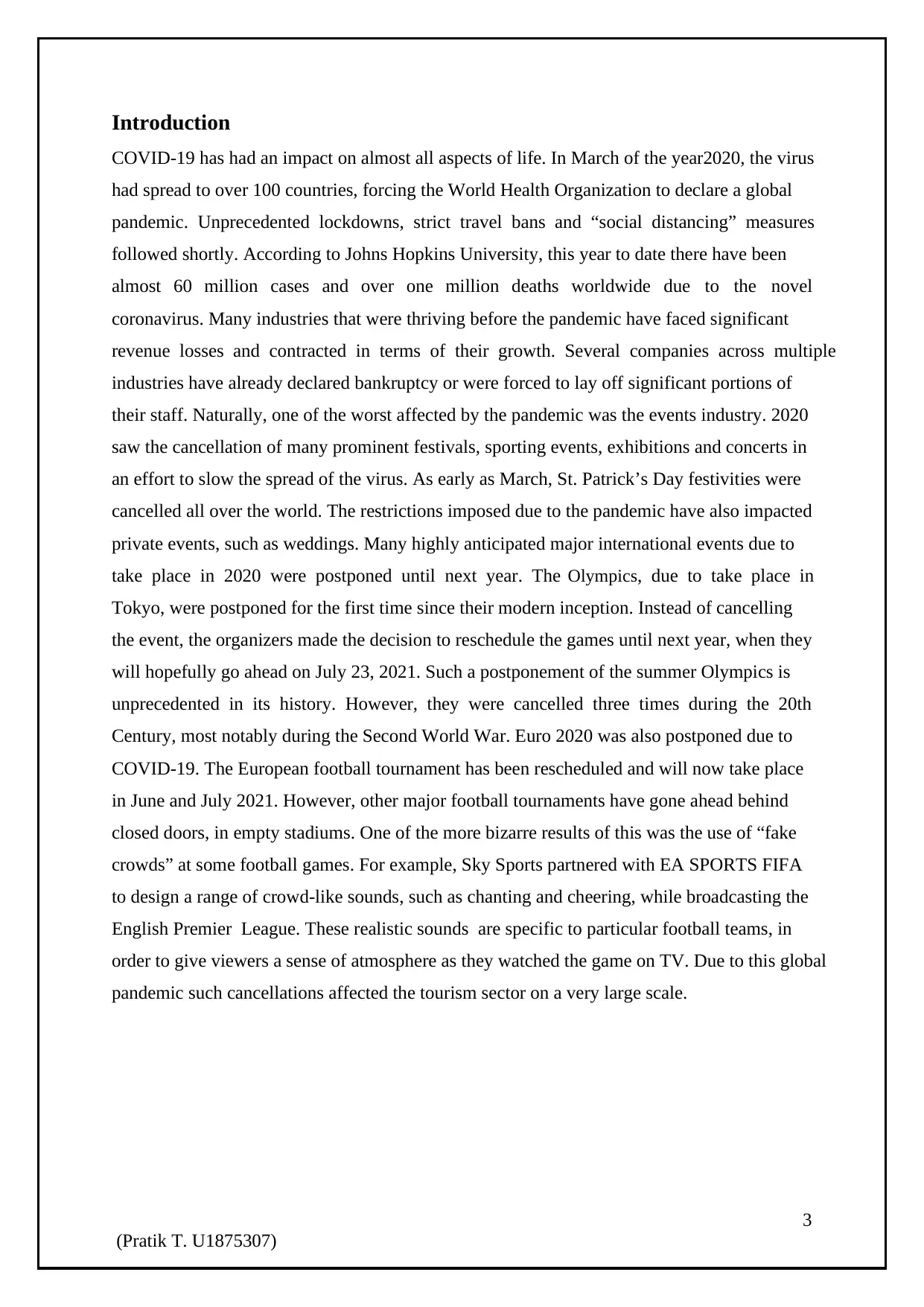
3
(Pratik T. U1875307)
Introduction
COVID-19 has had an impact on almost all aspects of life. In March of the year2020, the virus
had spread to over 100 countries, forcing the World Health Organization to declare a global
pandemic. Unprecedented lockdowns, strict travel bans and “social distancing” measures
followed shortly. According to Johns Hopkins University, this year to date there have been
almost 60 million cases and over one million deaths worldwide due to the novel
coronavirus. Many industries that were thriving before the pandemic have faced significant
revenue losses and contracted in terms of their growth. Several companies across multiple
industries have already declared bankruptcy or were forced to lay off significant portions of
their staff. Naturally, one of the worst affected by the pandemic was the events industry. 2020
saw the cancellation of many prominent festivals, sporting events, exhibitions and concerts in
an effort to slow the spread of the virus. As early as March, St. Patrick’s Day festivities were
cancelled all over the world. The restrictions imposed due to the pandemic have also impacted
private events, such as weddings. Many highly anticipated major international events due to
take place in 2020 were postponed until next year. The Olympics, due to take place in
Tokyo, were postponed for the first time since their modern inception. Instead of cancelling
the event, the organizers made the decision to reschedule the games until next year, when they
will hopefully go ahead on July 23, 2021. Such a postponement of the summer Olympics is
unprecedented in its history. However, they were cancelled three times during the 20th
Century, most notably during the Second World War. Euro 2020 was also postponed due to
COVID-19. The European football tournament has been rescheduled and will now take place
in June and July 2021. However, other major football tournaments have gone ahead behind
closed doors, in empty stadiums. One of the more bizarre results of this was the use of “fake
crowds” at some football games. For example, Sky Sports partnered with EA SPORTS FIFA
to design a range of crowd-like sounds, such as chanting and cheering, while broadcasting the
English Premier League. These realistic sounds are specific to particular football teams, in
order to give viewers a sense of atmosphere as they watched the game on TV. Due to this global
pandemic such cancellations affected the tourism sector on a very large scale.
(Pratik T. U1875307)
Introduction
COVID-19 has had an impact on almost all aspects of life. In March of the year2020, the virus
had spread to over 100 countries, forcing the World Health Organization to declare a global
pandemic. Unprecedented lockdowns, strict travel bans and “social distancing” measures
followed shortly. According to Johns Hopkins University, this year to date there have been
almost 60 million cases and over one million deaths worldwide due to the novel
coronavirus. Many industries that were thriving before the pandemic have faced significant
revenue losses and contracted in terms of their growth. Several companies across multiple
industries have already declared bankruptcy or were forced to lay off significant portions of
their staff. Naturally, one of the worst affected by the pandemic was the events industry. 2020
saw the cancellation of many prominent festivals, sporting events, exhibitions and concerts in
an effort to slow the spread of the virus. As early as March, St. Patrick’s Day festivities were
cancelled all over the world. The restrictions imposed due to the pandemic have also impacted
private events, such as weddings. Many highly anticipated major international events due to
take place in 2020 were postponed until next year. The Olympics, due to take place in
Tokyo, were postponed for the first time since their modern inception. Instead of cancelling
the event, the organizers made the decision to reschedule the games until next year, when they
will hopefully go ahead on July 23, 2021. Such a postponement of the summer Olympics is
unprecedented in its history. However, they were cancelled three times during the 20th
Century, most notably during the Second World War. Euro 2020 was also postponed due to
COVID-19. The European football tournament has been rescheduled and will now take place
in June and July 2021. However, other major football tournaments have gone ahead behind
closed doors, in empty stadiums. One of the more bizarre results of this was the use of “fake
crowds” at some football games. For example, Sky Sports partnered with EA SPORTS FIFA
to design a range of crowd-like sounds, such as chanting and cheering, while broadcasting the
English Premier League. These realistic sounds are specific to particular football teams, in
order to give viewers a sense of atmosphere as they watched the game on TV. Due to this global
pandemic such cancellations affected the tourism sector on a very large scale.
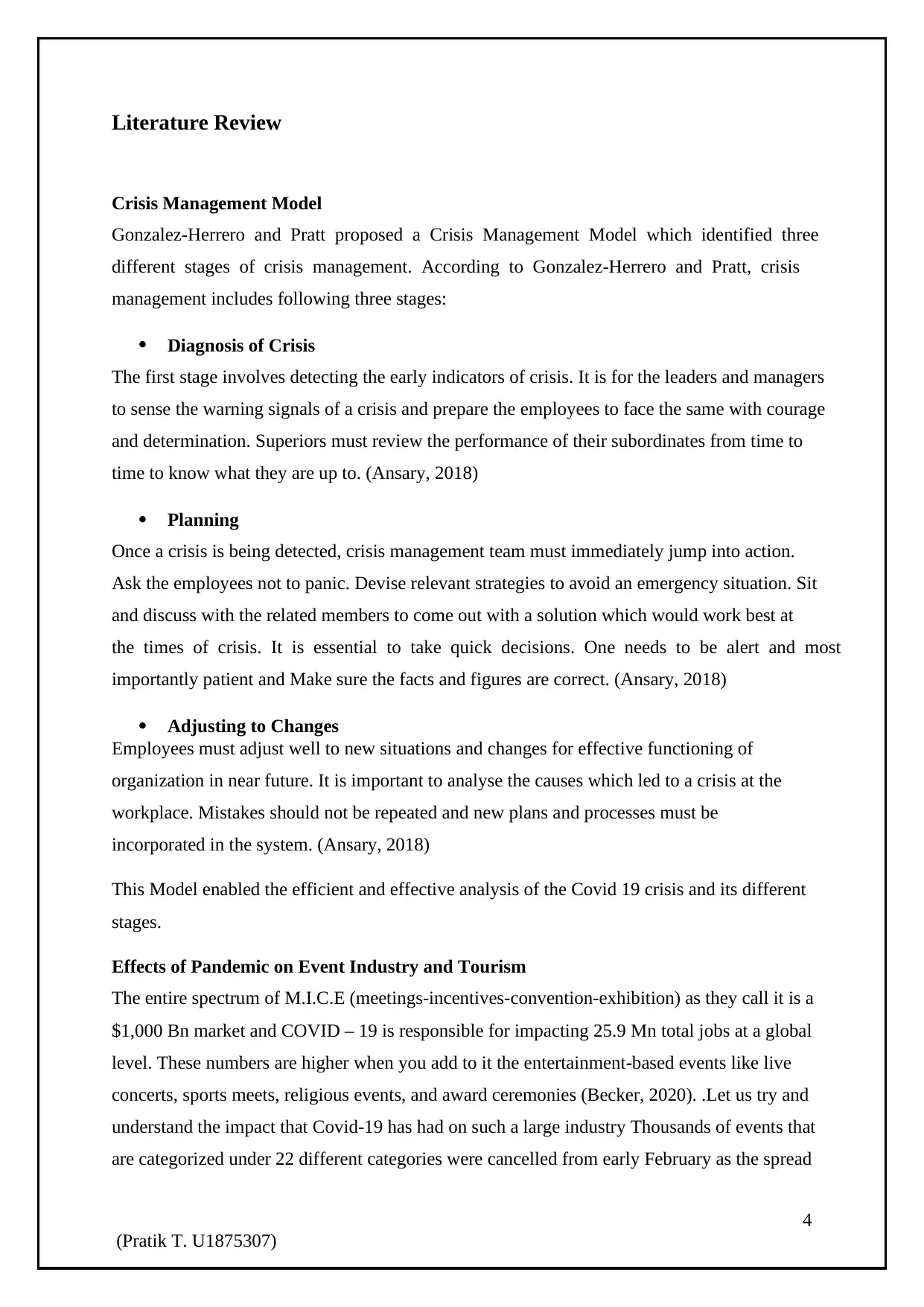
4
(Pratik T. U1875307)
Literature Review
Crisis Management Model
Gonzalez-Herrero and Pratt proposed a Crisis Management Model which identified three
different stages of crisis management. According to Gonzalez-Herrero and Pratt, crisis
management includes following three stages:
Diagnosis of Crisis
The first stage involves detecting the early indicators of crisis. It is for the leaders and managers
to sense the warning signals of a crisis and prepare the employees to face the same with courage
and determination. Superiors must review the performance of their subordinates from time to
time to know what they are up to. (Ansary, 2018)
Planning
Once a crisis is being detected, crisis management team must immediately jump into action.
Ask the employees not to panic. Devise relevant strategies to avoid an emergency situation. Sit
and discuss with the related members to come out with a solution which would work best at
the times of crisis. It is essential to take quick decisions. One needs to be alert and most
importantly patient and Make sure the facts and figures are correct. (Ansary, 2018)
Adjusting to Changes
Employees must adjust well to new situations and changes for effective functioning of
organization in near future. It is important to analyse the causes which led to a crisis at the
workplace. Mistakes should not be repeated and new plans and processes must be
incorporated in the system. (Ansary, 2018)
This Model enabled the efficient and effective analysis of the Covid 19 crisis and its different
stages.
Effects of Pandemic on Event Industry and Tourism
The entire spectrum of M.I.C.E (meetings-incentives-convention-exhibition) as they call it is a
$1,000 Bn market and COVID – 19 is responsible for impacting 25.9 Mn total jobs at a global
level. These numbers are higher when you add to it the entertainment-based events like live
concerts, sports meets, religious events, and award ceremonies (Becker, 2020). .Let us try and
understand the impact that Covid-19 has had on such a large industry Thousands of events that
are categorized under 22 different categories were cancelled from early February as the spread
(Pratik T. U1875307)
Literature Review
Crisis Management Model
Gonzalez-Herrero and Pratt proposed a Crisis Management Model which identified three
different stages of crisis management. According to Gonzalez-Herrero and Pratt, crisis
management includes following three stages:
Diagnosis of Crisis
The first stage involves detecting the early indicators of crisis. It is for the leaders and managers
to sense the warning signals of a crisis and prepare the employees to face the same with courage
and determination. Superiors must review the performance of their subordinates from time to
time to know what they are up to. (Ansary, 2018)
Planning
Once a crisis is being detected, crisis management team must immediately jump into action.
Ask the employees not to panic. Devise relevant strategies to avoid an emergency situation. Sit
and discuss with the related members to come out with a solution which would work best at
the times of crisis. It is essential to take quick decisions. One needs to be alert and most
importantly patient and Make sure the facts and figures are correct. (Ansary, 2018)
Adjusting to Changes
Employees must adjust well to new situations and changes for effective functioning of
organization in near future. It is important to analyse the causes which led to a crisis at the
workplace. Mistakes should not be repeated and new plans and processes must be
incorporated in the system. (Ansary, 2018)
This Model enabled the efficient and effective analysis of the Covid 19 crisis and its different
stages.
Effects of Pandemic on Event Industry and Tourism
The entire spectrum of M.I.C.E (meetings-incentives-convention-exhibition) as they call it is a
$1,000 Bn market and COVID – 19 is responsible for impacting 25.9 Mn total jobs at a global
level. These numbers are higher when you add to it the entertainment-based events like live
concerts, sports meets, religious events, and award ceremonies (Becker, 2020). .Let us try and
understand the impact that Covid-19 has had on such a large industry Thousands of events that
are categorized under 22 different categories were cancelled from early February as the spread
Secure Best Marks with AI Grader
Need help grading? Try our AI Grader for instant feedback on your assignments.
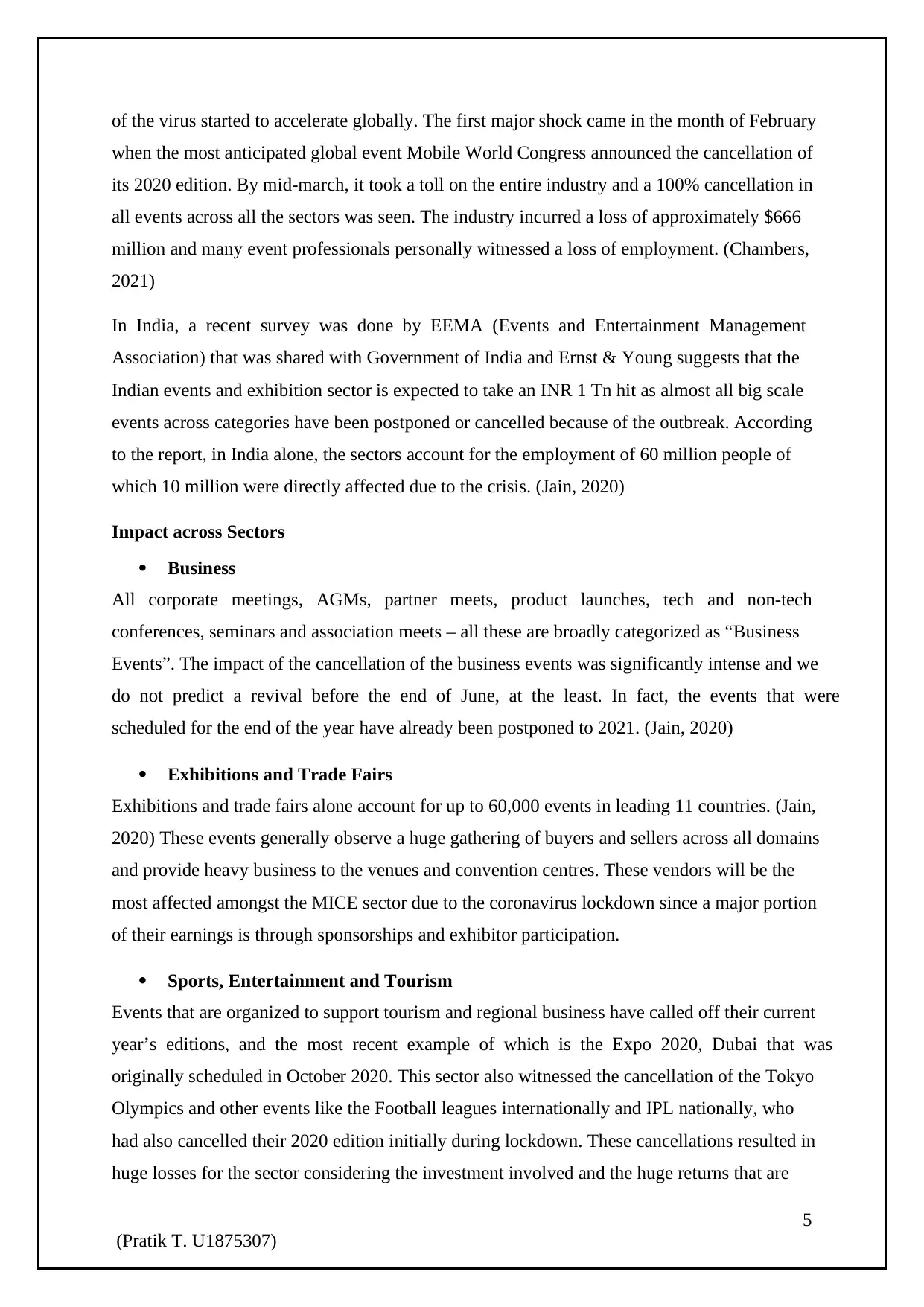
5
(Pratik T. U1875307)
of the virus started to accelerate globally. The first major shock came in the month of February
when the most anticipated global event Mobile World Congress announced the cancellation of
its 2020 edition. By mid-march, it took a toll on the entire industry and a 100% cancellation in
all events across all the sectors was seen. The industry incurred a loss of approximately $666
million and many event professionals personally witnessed a loss of employment. (Chambers,
2021)
In India, a recent survey was done by EEMA (Events and Entertainment Management
Association) that was shared with Government of India and Ernst & Young suggests that the
Indian events and exhibition sector is expected to take an INR 1 Tn hit as almost all big scale
events across categories have been postponed or cancelled because of the outbreak. According
to the report, in India alone, the sectors account for the employment of 60 million people of
which 10 million were directly affected due to the crisis. (Jain, 2020)
Impact across Sectors
Business
All corporate meetings, AGMs, partner meets, product launches, tech and non-tech
conferences, seminars and association meets – all these are broadly categorized as “Business
Events”. The impact of the cancellation of the business events was significantly intense and we
do not predict a revival before the end of June, at the least. In fact, the events that were
scheduled for the end of the year have already been postponed to 2021. (Jain, 2020)
Exhibitions and Trade Fairs
Exhibitions and trade fairs alone account for up to 60,000 events in leading 11 countries. (Jain,
2020) These events generally observe a huge gathering of buyers and sellers across all domains
and provide heavy business to the venues and convention centres. These vendors will be the
most affected amongst the MICE sector due to the coronavirus lockdown since a major portion
of their earnings is through sponsorships and exhibitor participation.
Sports, Entertainment and Tourism
Events that are organized to support tourism and regional business have called off their current
year’s editions, and the most recent example of which is the Expo 2020, Dubai that was
originally scheduled in October 2020. This sector also witnessed the cancellation of the Tokyo
Olympics and other events like the Football leagues internationally and IPL nationally, who
had also cancelled their 2020 edition initially during lockdown. These cancellations resulted in
huge losses for the sector considering the investment involved and the huge returns that are
(Pratik T. U1875307)
of the virus started to accelerate globally. The first major shock came in the month of February
when the most anticipated global event Mobile World Congress announced the cancellation of
its 2020 edition. By mid-march, it took a toll on the entire industry and a 100% cancellation in
all events across all the sectors was seen. The industry incurred a loss of approximately $666
million and many event professionals personally witnessed a loss of employment. (Chambers,
2021)
In India, a recent survey was done by EEMA (Events and Entertainment Management
Association) that was shared with Government of India and Ernst & Young suggests that the
Indian events and exhibition sector is expected to take an INR 1 Tn hit as almost all big scale
events across categories have been postponed or cancelled because of the outbreak. According
to the report, in India alone, the sectors account for the employment of 60 million people of
which 10 million were directly affected due to the crisis. (Jain, 2020)
Impact across Sectors
Business
All corporate meetings, AGMs, partner meets, product launches, tech and non-tech
conferences, seminars and association meets – all these are broadly categorized as “Business
Events”. The impact of the cancellation of the business events was significantly intense and we
do not predict a revival before the end of June, at the least. In fact, the events that were
scheduled for the end of the year have already been postponed to 2021. (Jain, 2020)
Exhibitions and Trade Fairs
Exhibitions and trade fairs alone account for up to 60,000 events in leading 11 countries. (Jain,
2020) These events generally observe a huge gathering of buyers and sellers across all domains
and provide heavy business to the venues and convention centres. These vendors will be the
most affected amongst the MICE sector due to the coronavirus lockdown since a major portion
of their earnings is through sponsorships and exhibitor participation.
Sports, Entertainment and Tourism
Events that are organized to support tourism and regional business have called off their current
year’s editions, and the most recent example of which is the Expo 2020, Dubai that was
originally scheduled in October 2020. This sector also witnessed the cancellation of the Tokyo
Olympics and other events like the Football leagues internationally and IPL nationally, who
had also cancelled their 2020 edition initially during lockdown. These cancellations resulted in
huge losses for the sector considering the investment involved and the huge returns that are
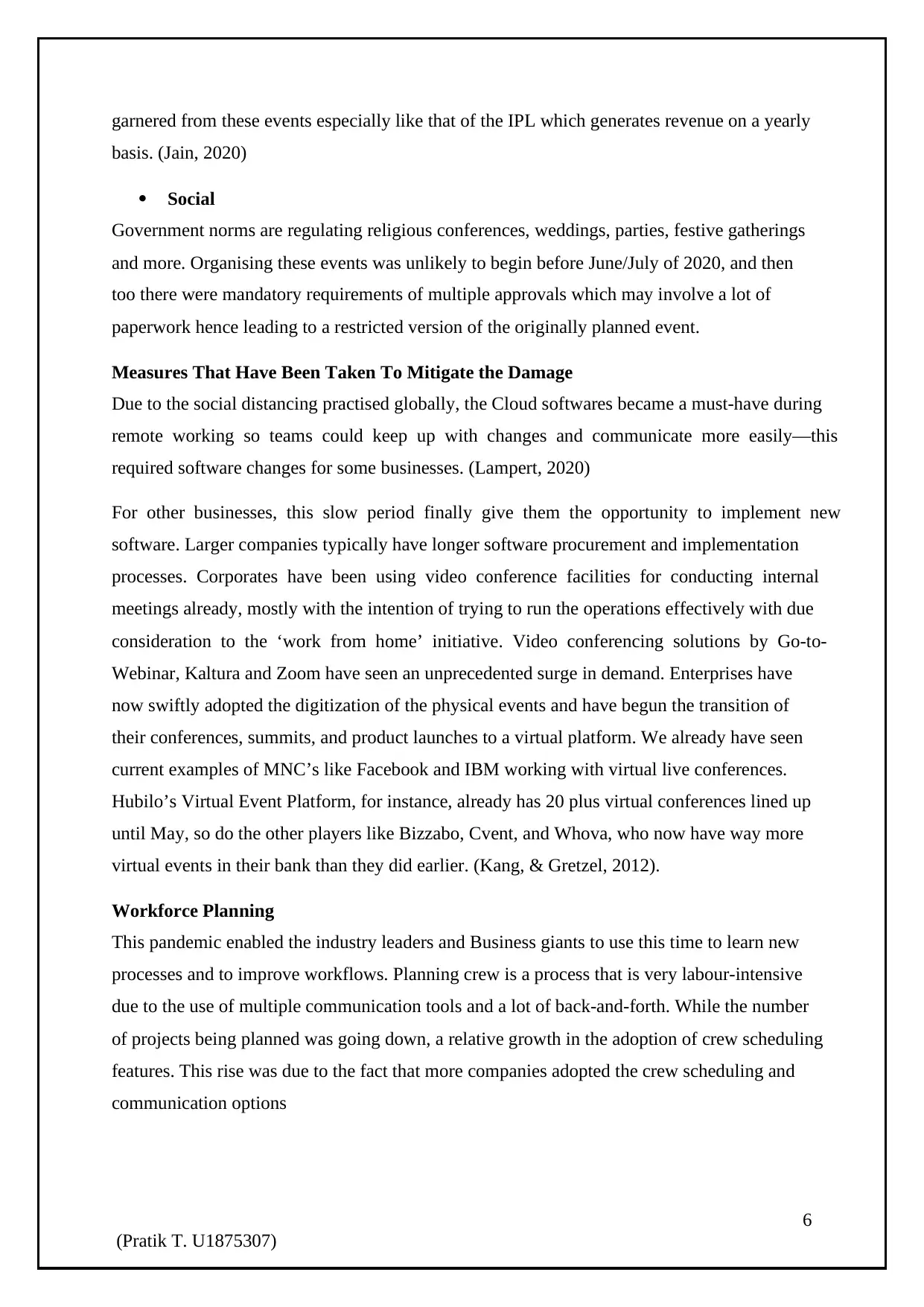
6
(Pratik T. U1875307)
garnered from these events especially like that of the IPL which generates revenue on a yearly
basis. (Jain, 2020)
Social
Government norms are regulating religious conferences, weddings, parties, festive gatherings
and more. Organising these events was unlikely to begin before June/July of 2020, and then
too there were mandatory requirements of multiple approvals which may involve a lot of
paperwork hence leading to a restricted version of the originally planned event.
Measures That Have Been Taken To Mitigate the Damage
Due to the social distancing practised globally, the Cloud softwares became a must-have during
remote working so teams could keep up with changes and communicate more easily—this
required software changes for some businesses. (Lampert, 2020)
For other businesses, this slow period finally give them the opportunity to implement new
software. Larger companies typically have longer software procurement and implementation
processes. Corporates have been using video conference facilities for conducting internal
meetings already, mostly with the intention of trying to run the operations effectively with due
consideration to the ‘work from home’ initiative. Video conferencing solutions by Go-to-
Webinar, Kaltura and Zoom have seen an unprecedented surge in demand. Enterprises have
now swiftly adopted the digitization of the physical events and have begun the transition of
their conferences, summits, and product launches to a virtual platform. We already have seen
current examples of MNC’s like Facebook and IBM working with virtual live conferences.
Hubilo’s Virtual Event Platform, for instance, already has 20 plus virtual conferences lined up
until May, so do the other players like Bizzabo, Cvent, and Whova, who now have way more
virtual events in their bank than they did earlier. (Kang, & Gretzel, 2012).
Workforce Planning
This pandemic enabled the industry leaders and Business giants to use this time to learn new
processes and to improve workflows. Planning crew is a process that is very labour-intensive
due to the use of multiple communication tools and a lot of back-and-forth. While the number
of projects being planned was going down, a relative growth in the adoption of crew scheduling
features. This rise was due to the fact that more companies adopted the crew scheduling and
communication options
(Pratik T. U1875307)
garnered from these events especially like that of the IPL which generates revenue on a yearly
basis. (Jain, 2020)
Social
Government norms are regulating religious conferences, weddings, parties, festive gatherings
and more. Organising these events was unlikely to begin before June/July of 2020, and then
too there were mandatory requirements of multiple approvals which may involve a lot of
paperwork hence leading to a restricted version of the originally planned event.
Measures That Have Been Taken To Mitigate the Damage
Due to the social distancing practised globally, the Cloud softwares became a must-have during
remote working so teams could keep up with changes and communicate more easily—this
required software changes for some businesses. (Lampert, 2020)
For other businesses, this slow period finally give them the opportunity to implement new
software. Larger companies typically have longer software procurement and implementation
processes. Corporates have been using video conference facilities for conducting internal
meetings already, mostly with the intention of trying to run the operations effectively with due
consideration to the ‘work from home’ initiative. Video conferencing solutions by Go-to-
Webinar, Kaltura and Zoom have seen an unprecedented surge in demand. Enterprises have
now swiftly adopted the digitization of the physical events and have begun the transition of
their conferences, summits, and product launches to a virtual platform. We already have seen
current examples of MNC’s like Facebook and IBM working with virtual live conferences.
Hubilo’s Virtual Event Platform, for instance, already has 20 plus virtual conferences lined up
until May, so do the other players like Bizzabo, Cvent, and Whova, who now have way more
virtual events in their bank than they did earlier. (Kang, & Gretzel, 2012).
Workforce Planning
This pandemic enabled the industry leaders and Business giants to use this time to learn new
processes and to improve workflows. Planning crew is a process that is very labour-intensive
due to the use of multiple communication tools and a lot of back-and-forth. While the number
of projects being planned was going down, a relative growth in the adoption of crew scheduling
features. This rise was due to the fact that more companies adopted the crew scheduling and
communication options
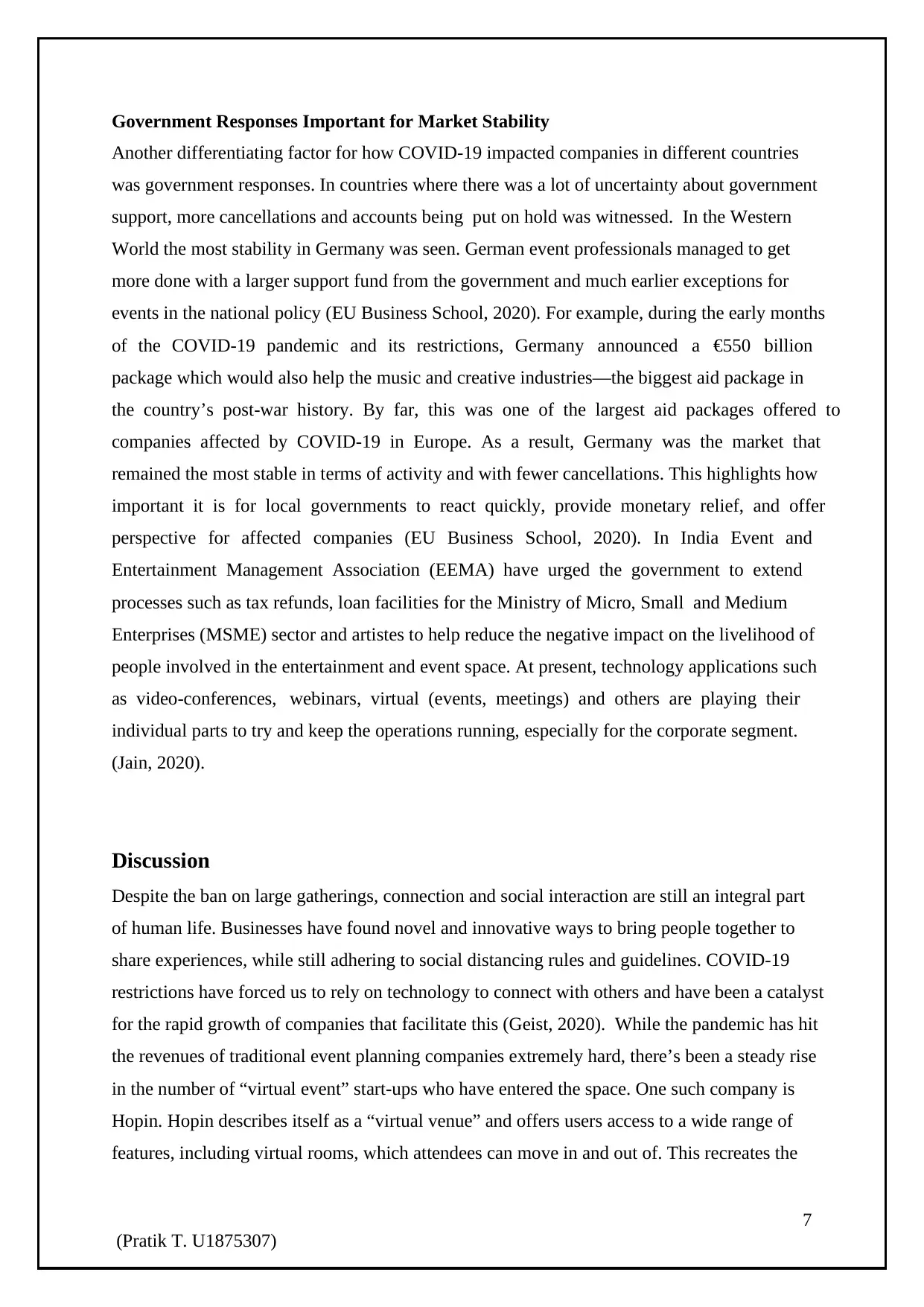
7
(Pratik T. U1875307)
Government Responses Important for Market Stability
Another differentiating factor for how COVID-19 impacted companies in different countries
was government responses. In countries where there was a lot of uncertainty about government
support, more cancellations and accounts being put on hold was witnessed. In the Western
World the most stability in Germany was seen. German event professionals managed to get
more done with a larger support fund from the government and much earlier exceptions for
events in the national policy (EU Business School, 2020). For example, during the early months
of the COVID-19 pandemic and its restrictions, Germany announced a €550 billion
package which would also help the music and creative industries—the biggest aid package in
the country’s post-war history. By far, this was one of the largest aid packages offered to
companies affected by COVID-19 in Europe. As a result, Germany was the market that
remained the most stable in terms of activity and with fewer cancellations. This highlights how
important it is for local governments to react quickly, provide monetary relief, and offer
perspective for affected companies (EU Business School, 2020). In India Event and
Entertainment Management Association (EEMA) have urged the government to extend
processes such as tax refunds, loan facilities for the Ministry of Micro, Small and Medium
Enterprises (MSME) sector and artistes to help reduce the negative impact on the livelihood of
people involved in the entertainment and event space. At present, technology applications such
as video-conferences, webinars, virtual (events, meetings) and others are playing their
individual parts to try and keep the operations running, especially for the corporate segment.
(Jain, 2020).
Discussion
Despite the ban on large gatherings, connection and social interaction are still an integral part
of human life. Businesses have found novel and innovative ways to bring people together to
share experiences, while still adhering to social distancing rules and guidelines. COVID-19
restrictions have forced us to rely on technology to connect with others and have been a catalyst
for the rapid growth of companies that facilitate this (Geist, 2020). While the pandemic has hit
the revenues of traditional event planning companies extremely hard, there’s been a steady rise
in the number of “virtual event” start-ups who have entered the space. One such company is
Hopin. Hopin describes itself as a “virtual venue” and offers users access to a wide range of
features, including virtual rooms, which attendees can move in and out of. This recreates the
(Pratik T. U1875307)
Government Responses Important for Market Stability
Another differentiating factor for how COVID-19 impacted companies in different countries
was government responses. In countries where there was a lot of uncertainty about government
support, more cancellations and accounts being put on hold was witnessed. In the Western
World the most stability in Germany was seen. German event professionals managed to get
more done with a larger support fund from the government and much earlier exceptions for
events in the national policy (EU Business School, 2020). For example, during the early months
of the COVID-19 pandemic and its restrictions, Germany announced a €550 billion
package which would also help the music and creative industries—the biggest aid package in
the country’s post-war history. By far, this was one of the largest aid packages offered to
companies affected by COVID-19 in Europe. As a result, Germany was the market that
remained the most stable in terms of activity and with fewer cancellations. This highlights how
important it is for local governments to react quickly, provide monetary relief, and offer
perspective for affected companies (EU Business School, 2020). In India Event and
Entertainment Management Association (EEMA) have urged the government to extend
processes such as tax refunds, loan facilities for the Ministry of Micro, Small and Medium
Enterprises (MSME) sector and artistes to help reduce the negative impact on the livelihood of
people involved in the entertainment and event space. At present, technology applications such
as video-conferences, webinars, virtual (events, meetings) and others are playing their
individual parts to try and keep the operations running, especially for the corporate segment.
(Jain, 2020).
Discussion
Despite the ban on large gatherings, connection and social interaction are still an integral part
of human life. Businesses have found novel and innovative ways to bring people together to
share experiences, while still adhering to social distancing rules and guidelines. COVID-19
restrictions have forced us to rely on technology to connect with others and have been a catalyst
for the rapid growth of companies that facilitate this (Geist, 2020). While the pandemic has hit
the revenues of traditional event planning companies extremely hard, there’s been a steady rise
in the number of “virtual event” start-ups who have entered the space. One such company is
Hopin. Hopin describes itself as a “virtual venue” and offers users access to a wide range of
features, including virtual rooms, which attendees can move in and out of. This recreates the
Paraphrase This Document
Need a fresh take? Get an instant paraphrase of this document with our AI Paraphraser
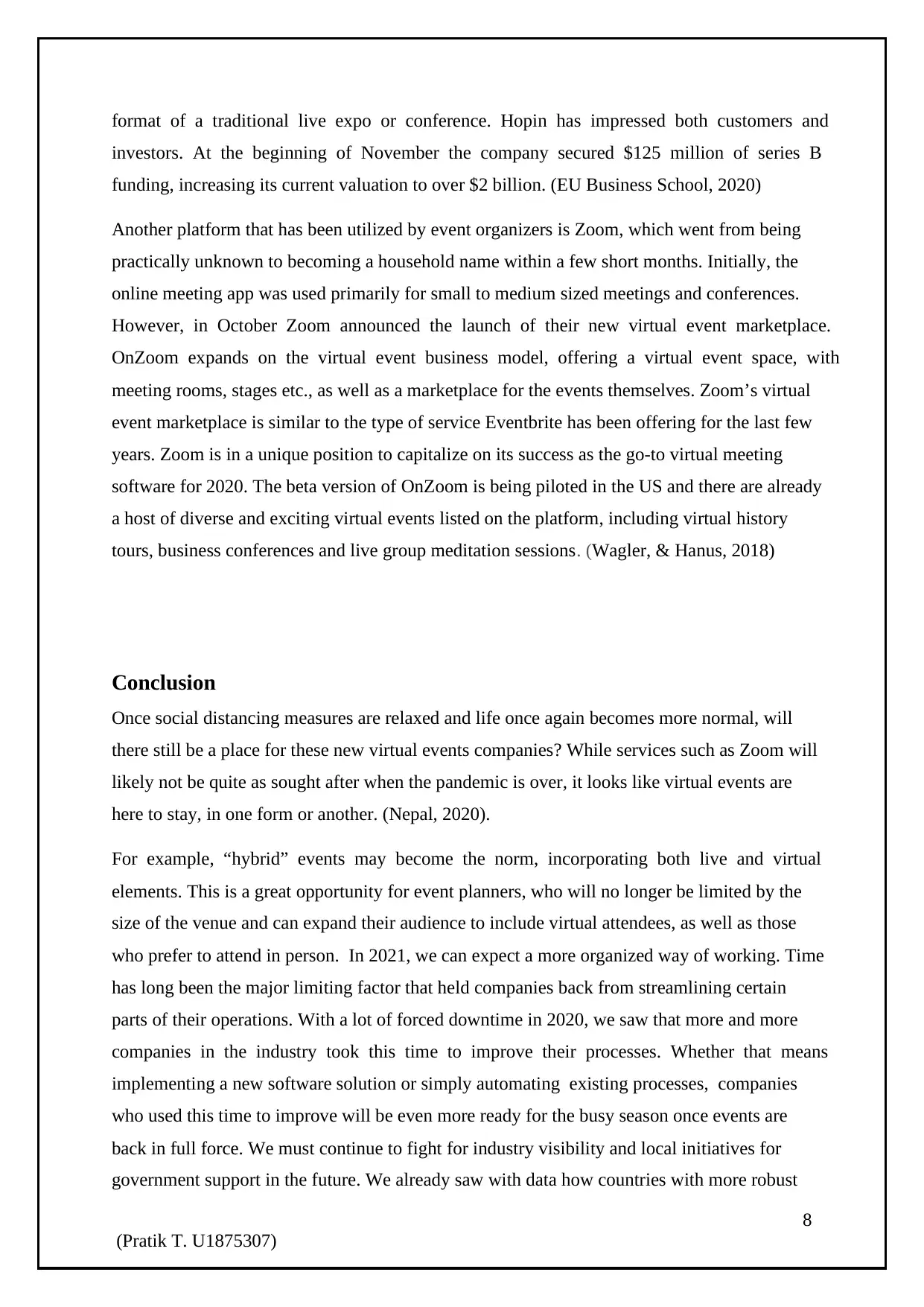
8
(Pratik T. U1875307)
format of a traditional live expo or conference. Hopin has impressed both customers and
investors. At the beginning of November the company secured $125 million of series B
funding, increasing its current valuation to over $2 billion. (EU Business School, 2020)
Another platform that has been utilized by event organizers is Zoom, which went from being
practically unknown to becoming a household name within a few short months. Initially, the
online meeting app was used primarily for small to medium sized meetings and conferences.
However, in October Zoom announced the launch of their new virtual event marketplace.
OnZoom expands on the virtual event business model, offering a virtual event space, with
meeting rooms, stages etc., as well as a marketplace for the events themselves. Zoom’s virtual
event marketplace is similar to the type of service Eventbrite has been offering for the last few
years. Zoom is in a unique position to capitalize on its success as the go-to virtual meeting
software for 2020. The beta version of OnZoom is being piloted in the US and there are already
a host of diverse and exciting virtual events listed on the platform, including virtual history
tours, business conferences and live group meditation sessions. (Wagler, & Hanus, 2018)
Conclusion
Once social distancing measures are relaxed and life once again becomes more normal, will
there still be a place for these new virtual events companies? While services such as Zoom will
likely not be quite as sought after when the pandemic is over, it looks like virtual events are
here to stay, in one form or another. (Nepal, 2020).
For example, “hybrid” events may become the norm, incorporating both live and virtual
elements. This is a great opportunity for event planners, who will no longer be limited by the
size of the venue and can expand their audience to include virtual attendees, as well as those
who prefer to attend in person. In 2021, we can expect a more organized way of working. Time
has long been the major limiting factor that held companies back from streamlining certain
parts of their operations. With a lot of forced downtime in 2020, we saw that more and more
companies in the industry took this time to improve their processes. Whether that means
implementing a new software solution or simply automating existing processes, companies
who used this time to improve will be even more ready for the busy season once events are
back in full force. We must continue to fight for industry visibility and local initiatives for
government support in the future. We already saw with data how countries with more robust
(Pratik T. U1875307)
format of a traditional live expo or conference. Hopin has impressed both customers and
investors. At the beginning of November the company secured $125 million of series B
funding, increasing its current valuation to over $2 billion. (EU Business School, 2020)
Another platform that has been utilized by event organizers is Zoom, which went from being
practically unknown to becoming a household name within a few short months. Initially, the
online meeting app was used primarily for small to medium sized meetings and conferences.
However, in October Zoom announced the launch of their new virtual event marketplace.
OnZoom expands on the virtual event business model, offering a virtual event space, with
meeting rooms, stages etc., as well as a marketplace for the events themselves. Zoom’s virtual
event marketplace is similar to the type of service Eventbrite has been offering for the last few
years. Zoom is in a unique position to capitalize on its success as the go-to virtual meeting
software for 2020. The beta version of OnZoom is being piloted in the US and there are already
a host of diverse and exciting virtual events listed on the platform, including virtual history
tours, business conferences and live group meditation sessions. (Wagler, & Hanus, 2018)
Conclusion
Once social distancing measures are relaxed and life once again becomes more normal, will
there still be a place for these new virtual events companies? While services such as Zoom will
likely not be quite as sought after when the pandemic is over, it looks like virtual events are
here to stay, in one form or another. (Nepal, 2020).
For example, “hybrid” events may become the norm, incorporating both live and virtual
elements. This is a great opportunity for event planners, who will no longer be limited by the
size of the venue and can expand their audience to include virtual attendees, as well as those
who prefer to attend in person. In 2021, we can expect a more organized way of working. Time
has long been the major limiting factor that held companies back from streamlining certain
parts of their operations. With a lot of forced downtime in 2020, we saw that more and more
companies in the industry took this time to improve their processes. Whether that means
implementing a new software solution or simply automating existing processes, companies
who used this time to improve will be even more ready for the busy season once events are
back in full force. We must continue to fight for industry visibility and local initiatives for
government support in the future. We already saw with data how countries with more robust
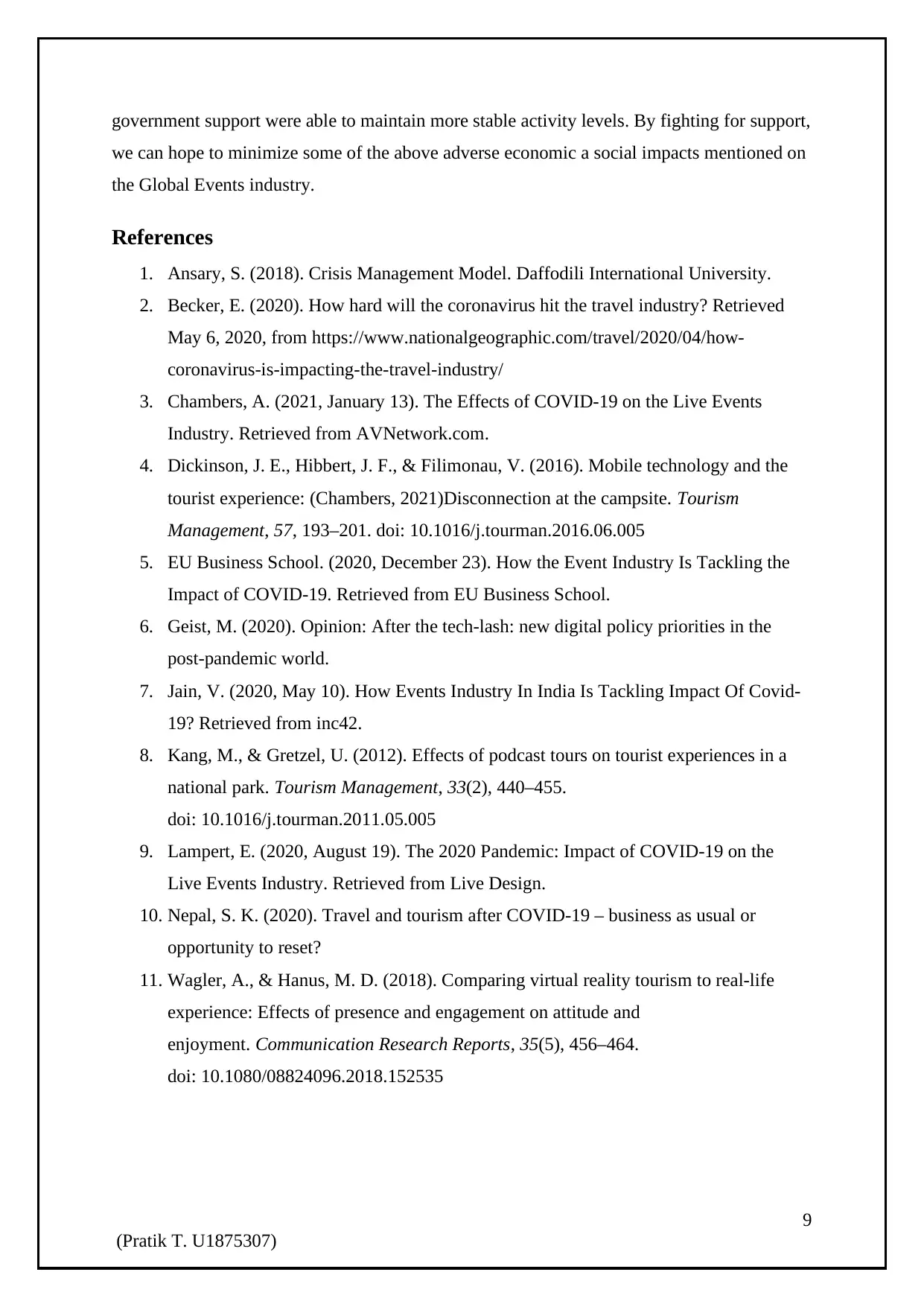
9
(Pratik T. U1875307)
government support were able to maintain more stable activity levels. By fighting for support,
we can hope to minimize some of the above adverse economic a social impacts mentioned on
the Global Events industry.
References
1. Ansary, S. (2018). Crisis Management Model. Daffodili International University.
2. Becker, E. (2020). How hard will the coronavirus hit the travel industry? Retrieved
May 6, 2020, from https://www.nationalgeographic.com/travel/2020/04/how-
coronavirus-is-impacting-the-travel-industry/
3. Chambers, A. (2021, January 13). The Effects of COVID-19 on the Live Events
Industry. Retrieved from AVNetwork.com.
4. Dickinson, J. E., Hibbert, J. F., & Filimonau, V. (2016). Mobile technology and the
tourist experience: (Chambers, 2021)Disconnection at the campsite. Tourism
Management, 57, 193–201. doi: 10.1016/j.tourman.2016.06.005
5. EU Business School. (2020, December 23). How the Event Industry Is Tackling the
Impact of COVID-19. Retrieved from EU Business School.
6. Geist, M. (2020). Opinion: After the tech-lash: new digital policy priorities in the
post-pandemic world.
7. Jain, V. (2020, May 10). How Events Industry In India Is Tackling Impact Of Covid-
19? Retrieved from inc42.
8. Kang, M., & Gretzel, U. (2012). Effects of podcast tours on tourist experiences in a
national park. Tourism Management, 33(2), 440–455.
doi: 10.1016/j.tourman.2011.05.005
9. Lampert, E. (2020, August 19). The 2020 Pandemic: Impact of COVID-19 on the
Live Events Industry. Retrieved from Live Design.
10. Nepal, S. K. (2020). Travel and tourism after COVID-19 – business as usual or
opportunity to reset?
11. Wagler, A., & Hanus, M. D. (2018). Comparing virtual reality tourism to real-life
experience: Effects of presence and engagement on attitude and
enjoyment. Communication Research Reports, 35(5), 456–464.
doi: 10.1080/08824096.2018.152535
(Pratik T. U1875307)
government support were able to maintain more stable activity levels. By fighting for support,
we can hope to minimize some of the above adverse economic a social impacts mentioned on
the Global Events industry.
References
1. Ansary, S. (2018). Crisis Management Model. Daffodili International University.
2. Becker, E. (2020). How hard will the coronavirus hit the travel industry? Retrieved
May 6, 2020, from https://www.nationalgeographic.com/travel/2020/04/how-
coronavirus-is-impacting-the-travel-industry/
3. Chambers, A. (2021, January 13). The Effects of COVID-19 on the Live Events
Industry. Retrieved from AVNetwork.com.
4. Dickinson, J. E., Hibbert, J. F., & Filimonau, V. (2016). Mobile technology and the
tourist experience: (Chambers, 2021)Disconnection at the campsite. Tourism
Management, 57, 193–201. doi: 10.1016/j.tourman.2016.06.005
5. EU Business School. (2020, December 23). How the Event Industry Is Tackling the
Impact of COVID-19. Retrieved from EU Business School.
6. Geist, M. (2020). Opinion: After the tech-lash: new digital policy priorities in the
post-pandemic world.
7. Jain, V. (2020, May 10). How Events Industry In India Is Tackling Impact Of Covid-
19? Retrieved from inc42.
8. Kang, M., & Gretzel, U. (2012). Effects of podcast tours on tourist experiences in a
national park. Tourism Management, 33(2), 440–455.
doi: 10.1016/j.tourman.2011.05.005
9. Lampert, E. (2020, August 19). The 2020 Pandemic: Impact of COVID-19 on the
Live Events Industry. Retrieved from Live Design.
10. Nepal, S. K. (2020). Travel and tourism after COVID-19 – business as usual or
opportunity to reset?
11. Wagler, A., & Hanus, M. D. (2018). Comparing virtual reality tourism to real-life
experience: Effects of presence and engagement on attitude and
enjoyment. Communication Research Reports, 35(5), 456–464.
doi: 10.1080/08824096.2018.152535
1 out of 9
Related Documents
Your All-in-One AI-Powered Toolkit for Academic Success.
+13062052269
info@desklib.com
Available 24*7 on WhatsApp / Email
![[object Object]](/_next/static/media/star-bottom.7253800d.svg)
Unlock your academic potential
© 2024 | Zucol Services PVT LTD | All rights reserved.



